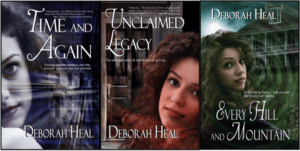I’d like to welcome fellow author Deborah Heal to the blog today. Deborah has written the Time and Again series, three Christian fantasy books for Young Adult readers. Book 1, Time and Again, reached just hit #1 for Christian Fantasy on Amazon. And the Kindle edition is on sale for $.99 until the end of August.
Deborah’s third book in the series, Every Hill and Mountain, caught my attention recently and I wanted to share it with you. Here’s Deborah to tell us how she came to write this book.
 The Education of One White Woman
The Education of One White Woman
Every Hill and Mountain is an assignment I turned in for the continuing education program I’m involved with. You know, that life-long business of becoming more sanctified. As slow as I’m learning things, I figure God may decide to keep me in school another hundred years or so before he lets me into Heaven.
By that, I’m not saying I will have arrived, become perfect, and thus will deserve to get into Heaven—not even after a thousand years. But apparently, God thinks it’s good for us to come smack up against our ignorance, stupidity, and foulness for a while in this life so we we’ll appreciate His perfection all the more in the life to come.
I have a friend of the New Age persuasion who does believe in the perfectibility of human beings. We had a conversation a while back about racism, in which I said everyone’s prejudiced to one degree or another. He got quite irate and said, “Hey, speak for yourself!” He claimed to be completely free of this fault.
But I know I’m right. No one reaches perfection in any aspect of his being. Not in this life. Whether I like it or not, I’m a racist to one degree or another. But I have come a long way through the years as God continues to work me.
My first teacher on the subject of race was my aunt (God rest her soul). The lesson came when I was five or six and as a treat, she took me to shop at the Ben Franklin store. When we got out of the car, she called my attention to some people standing on the sidewalk across the street. “See those niggers over there,” she whispered. “Watch out. They’ll cut your ears off if they ever hear you call them nigger.” The sad thing is, I think my aunt was really trying to help me.
It was the first time I’d heard the “N” word, and taking her teaching as Gospel truth, I solemnly promised never to use that word. My aunt’s anxiety was transmitted to me, but here’s the funny part: I couldn’t distinguish those people on the sidewalk from anyone else. I remember being so confused.
My racist education continued in the small rural town where I grew up. I don’t remember anyone slinging racial slurs in the elementary school, but maybe the subject of race never came up because the school was completely 100% bona fide white. My first experience meeting and speaking to a minority came when I reached high school in the late 1960s and was surprised to find four or five African-American students there. During that time, the news on TV was filled with stories about race riots in cities across the country, including nearby East St. Louis. I wondered (a bit indignantly) why those Negroes were so angry. After all, Lincoln had emancipated them, hadn’t he? The Negroes in our school seemed happy. Of course some of them seemed overly anxious to please and the rest just kept their heads down and mouths shut and worked on being invisible.
The African-American students at my high school never mentioned any reasons for discontent, and our teachers were completely silent about race issues. The rumor that Dr. Martin Luther King was a Communist made its way into discussions among students and around the family dinner table. And when he was assassinated, while we didn’t rejoice, we were relieved he wouldn’t be able to spread violence and his evil doctrines any more. I managed to graduate from high school and get on with adult life without ever once hearing anything about Jim Crow, disenfranchisement, “separate, but equal” or any of the other abominations the black community suffered through.
It wasn’t until I went to college that my ignorance began to be chipped away by the power of the written word. I learned a valuable lesson about the importance of using primary sources when I read Martin Luther King’s “Letters from a Birmingham Jail.” With no trumped up rumors and slanted newscasts between the writer and the reader, the truth came shining through on the page. I was astounded by his logic and moved to tears by his eloquence and gentleness. I decided that if he was a Communist, then I was an astronaut.
Later my brain was exercised with the biographies of Frederick Douglas, George Washington Carver, and Booker T. Washington. Other books in the curriculum for this white woman’s continuing education were To Kill a Mockingbird and Black Like Me and Growing up Black and The Emancipation of Robert Sadler (Read my book review HERE) and Dick Gregory’s autobiography Nigger and Maya Angelou’s I Know Why the Caged Bird Sings.
The written word had made a powerful impact on my thinking, and I took that lesson into the classroom when I became an English teacher at other small rural, all white schools. I wish I could report that my students were much more sophisticated in their thinking than I had been at that age. The majority of them probably were, but I’m sad to say that in virtually every class that I taught To Kill a Mockingbird and I Know Why the Caged Bird Sings, (much less mentioned Black History Month) two questions inevitably would be raised by students:
1. Why do we have to learn this? After all we don’t have any African-American students at our school.
2. Aren’t we the ones being discriminated against now, and isn’t everything hunky dory for Blacks now?
Their attitude caused me to shed a tear or two, but also to be reminded of how much my own sinfulness causes God to sorrow. But like Martin Luther King,
I have a dream that one day every valley shall be exalted, every hill and mountain shall be made low, the rough places will be made plain, and the crooked places will be made straight, and the glory of the Lord shall be revealed, and all flesh shall see it together.
In other words, I long for the day when all God’s children will be freed from the bondage of ignorance and sin. On that day, we’ll be past all the striving and–with equal access—turn our attention to where it should have been all along, on God’s glory.
The characters in Every Hill and Mountain get a chance to experience firsthand what it was like to be a slave in pre-war Illinois when they find a weird computer program that lets them travel back in time. Abby calls it “time-surfing.” It’s only virtual time travel because I didn’t want them to accidentally mess up the whole space-time continuum thing. But it’s amazing all the same.
A few Christians have seemed a bit uncomfortable about this fantasy concept of time-surfing. But as Brother Greenfield says in Every Hill and Mountain, “Our God is omniscient, omnipotent, and omnipresent. Hallelujah! If he wants to give us a gift like that, he can.”
It’s an amazing gift, all right. Except sometimes Abby and her friends learn more than they ever wanted to know about people from the past. Still, studying their lives of people teaches them about God’s love and goodness in a new way. From the distance that only time gives, they clearly see that God has a plan for his people, that He’s in the business of redemption, that He makes all things new. I hope my readers get that. Writing about it reminded me, too.
Here’s an excerpt from Every Hill and Mountain:
It was nearly dark, and the broom Pauly carried was taller than he was. He took care to hold it close to his skinny chest so it wouldn’t trip him on the icy stone steps. The door at the bottom wasn’t closed all the way and he put his right eye up to it and peeked in. Two white ladies with lanterns were fussing over something in a crate. He heard Jim huffing behind him and jumped back guiltily.
Jim’s black face was sweaty even though the December air was cold, and the tendons on his neck stood out as he wheeled the coal scuttle toward the steps.
“Get that door open for me, boy. Can’t you see I’m coming?”
“They is ladies in there.”
Jim eased the scuttle carefully down each step with a soft grunt. It wouldn’t do to spill coal all over Preacher Farris’s clean white snow right before the Christmas pageant. When he reached the bottom, he went to the door and took a quick look.
“They getting the Christmas doo-dads ready. We best wait ‘til they go back upstairs.” He sat on the bottom step and opened up his coat. “Come here, boy, else you freeze where you stand.”
Pauly went to stand next to Jim and allowed him to fold him into his warmth. “Will they have a Christmas tree, do you think? I ain’t never saw a Christmas tree, but Lil saw Miz Granger’s last year up at the big house.”
“Hush your foolishness, boy. That ain’t for the likes of us.” Jim dug into his pocket and pulled out a baked potato and handed it to him. “It’s still warm. Put it in your pocket, and it’ll keep your hands from freezing.”
“Listen!” Pauly said.
Jim smiled and pulled his coat closer around the boy. “Ah, the choir’s done started their practicing.”
Pauly burrowed up out of Jim’s coat and stood transfixed as the music floated down to where they waited in the gloaming to unload the coal. The words were clear as the crisp air, sung by ladies with high, pure voices, and gentlemen with low, mellow ones. Although he had no idea of their meaning, the words washed over him, filling him with happiness.
“What they be singing, Jim?”
“That song’s called Joy to the World. Sounds like angels, don’t it? When we get to Heaven we’ll be a singin’ with them, I reckon,” Jim said with a chuckle.
Pauly wiped the snot from his nose and looked up at Jim. “Don’t you know, Jim? Negroes don’t go to Heaven.” He patted Jim’s arm. “Miz Granger, she say Negroes don’t got no souls.”
“You come here right now, boy.” Jim frowned at him and Pauly was scared he meant to thrash him. Jim pulled him close and stared into his eyes. “You listen to me, Pauly. That’s a big, fat lie, and don’t you believe it.” He shook him. “You got a soul just like them white folks, you hear? Preacher Edmunds needs to give you a Jesus talk.”
Jim set the boy aside, hauled himself up from the step, and went back to peek in the door. The ladies had left, so he opened it wide and then guided the scuttle over the threshold and into the church basement.
“Come along, boy. See that you sweep up all the coal dust.”
Pauly blinked three times and then picked up his broom and followed Jim.
***
Flashing red and blue lights streamed down into the dark stairwell where Abby and John sat, and they looked at each other in alarm. While John closed his laptop, she crawled up two steps and looked out. One block down, Chief Logan was putting the orange barricades he had used to block off Lane Street into the trunk of his cruiser. Amazingly, all the vendors had cleared out while they were time-surfing. The only sign left of the Salt Festival was the yellow banner overhead and the sound of Eagle Creek’s bluegrass drifting to them on the evening breeze.
The warm evening breeze. Abby rubbed the chill out of her arms and reminded herself that it was August not December.
After shouldering his backpack, John joined her on the step. Chief Logan closed the trunk and got in the cruiser. His brake lights came on, and then he turned onto Lane Street toward them. They ducked back into the stairwell until he was past.
“Come on,” John said, taking her hand. “Let’s go find Kate and Turner before they report us missing.”
Abby pulled her hand out of his. “Wait just one minute.” She dug in her purse for a tissue, but couldn’t find one. “I need a second before I go charging back into the 21st century.”
“Here.” John pulled a genuine, old-fashioned handkerchief from his pocket and handed it to her.
Who knew they even still made those? She wiped her eyes and nose and then tucked it into her own pocket. John drew her into his arms, and they stood for a moment swaying to the distant music.
“Can you imagine?” She swallowed and willed herself not to cry. “Can you imagine being told you have no soul? How can people warp the Scriptures so out of shape?”
“And I thought it was bad when Mr. White told his wife that women weren’t made in the image of God.”
“You’re a good man, John Roberts.” She took a deep breath and expelled it. “Okay. I can do this now.” She took his hand and they started down the street.
 Deborah Heal, the author of the Time and Again time-travel mystery series, was born not far from the setting of her book Every Hill and Mountain and grew up “just down the road” from the setting of Time and Again and Unclaimed Legacy. Today she lives with her husband in Waterloo, Illinois, where she enjoys reading, gardening, and learning about regional history. She has three grown children, four grandchildren, and two canine buddies Digger and Scout. She loves to interact with her readers, who may learn more about the history behind the books at her website http://www.deborahheal.com and her Facebook author page. Her books may be purchased in paper and ebook formats at Amazon.com.
Deborah Heal, the author of the Time and Again time-travel mystery series, was born not far from the setting of her book Every Hill and Mountain and grew up “just down the road” from the setting of Time and Again and Unclaimed Legacy. Today she lives with her husband in Waterloo, Illinois, where she enjoys reading, gardening, and learning about regional history. She has three grown children, four grandchildren, and two canine buddies Digger and Scout. She loves to interact with her readers, who may learn more about the history behind the books at her website http://www.deborahheal.com and her Facebook author page. Her books may be purchased in paper and ebook formats at Amazon.com.


